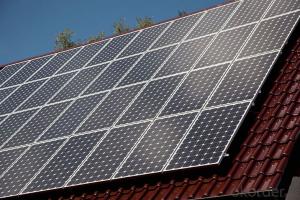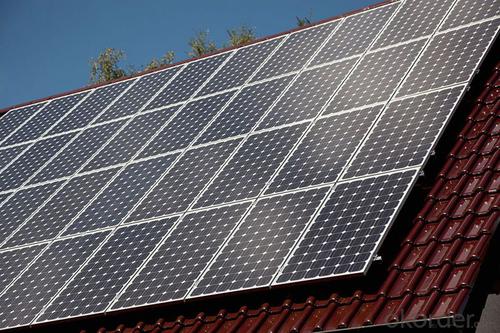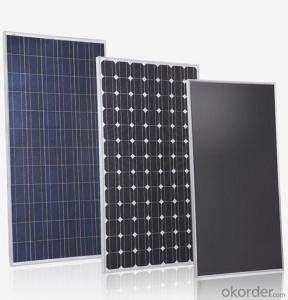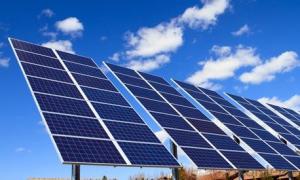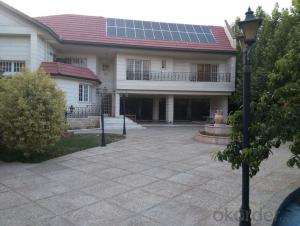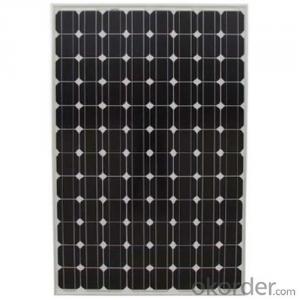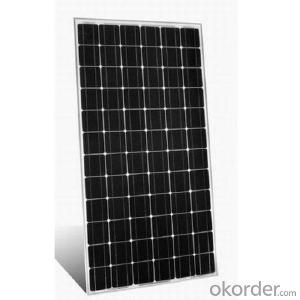Solar Panels Norfolk - Energy Saving Photovoltaic Panels Purchase
- Loading Port:
- Shanghai
- Payment Terms:
- TT OR LC
- Min Order Qty:
- 7875 watt
- Supply Capability:
- 10000000 watt/month
OKorder Service Pledge
OKorder Financial Service
You Might Also Like
Specification
Solar Module Summarize
Solar Module is the core part of solar PV power systems, also is the highest value part of it. The function of Solar Module is to convert the sun's radiation to electrical energy, or transfer it to battery and store in it, or to drive the load running.
The Product has been widely used in space and ground, it mainly used for power generation systems, charging systems, road lighting and traffic signs areas. It could offer a wide range of power and voltage, and with high conversion efficiency, and long service life.
Company Description
CNBM International Corporation, as an important external business platform of CNBM Group, plays as a role to export solar products produced by CNBM. Headquartered in Beijing, We have entered into Solar PV industry since 2005. CNBM Solar is specialized in PV power systems which takes advantage of reliable supplying, convenient installation and free maintenance, and has been used widely, and it is the compensation and substitution of normal power supply. We provide power solutions for home, business and industrial customers, and provide off-grid PV systems for rural area. Our company not only can supply high quality solar Products, but also provides professional system Solutions and high quality services.
Technical Parameter:
Model Type | Good Quality 250W Solar Panel |
Peak Power-Pmax(W) | 250W |
Open Circuit Voltage-Voc(V) | 44.2 |
Maximum Power Voltage-Vmp(V) | 36 |
Short Circuit Current-Isc(A) | 5.4 |
Maximum Power Current-Imp(A) | 5 |
Maximum System Voltage | 1000V DC |
Maximum Series Fuse Rating | 10A |
Power Tolerance | -1~+3% |
Temperature Coefficients of Pmax | -0.45%/℃ |
Temperature Coefficients of Voc | -0.348%/℃ |
Temperature Coefficients of Isc | 0.031%/℃ |
Nominal Operating Cell Temperature | 44.5±2℃ |
Standard Testing Condition(STC) | Irradiance:1000W/m²;Temperature:25℃;AM=1.5 |
Qualification Test Parameters | |
Operating Temperature | -40℃~+85℃ |
Storage Temperature | -40℃~+85℃ |
Pressure Bearing | ≥5400Pascal/m² |
Wind Bearing | ≥5400Pascal/m² |
Mechanical Characteristics | |
Cell Size | Mono 156*156mm±0.5 |
No.of Cells | 60pcs(6*10) |
Dimension | 1640*992*40mm |
Weight | 18.8Kg |
Glass | 3.2mm High Transmission,Low Iron |
Frame | Anodized Aluminum Alloy |
Junction Box | IP65Rated |
Internal Diodes | 3 Bypass Diodes |
Cable | 1*4.0mm² Length 900mm |
Product Show:
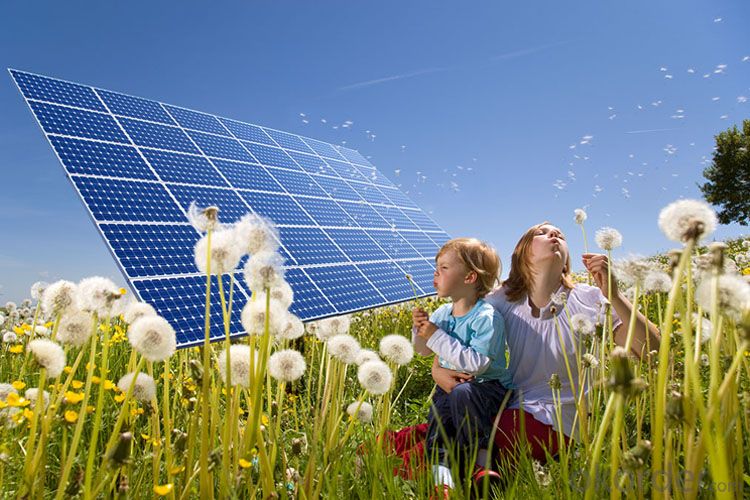
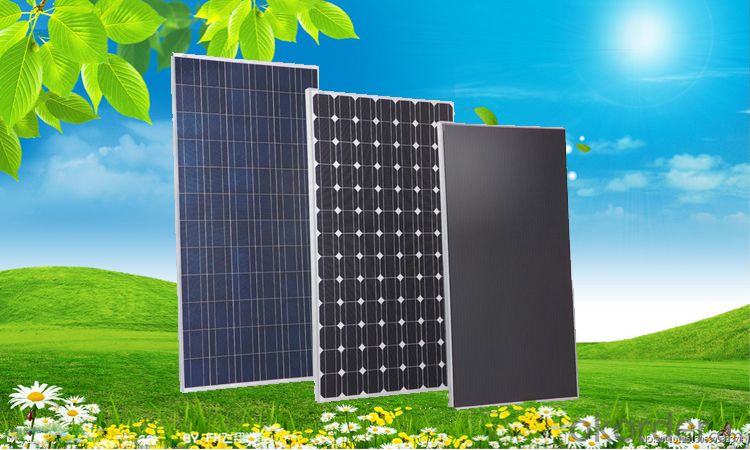
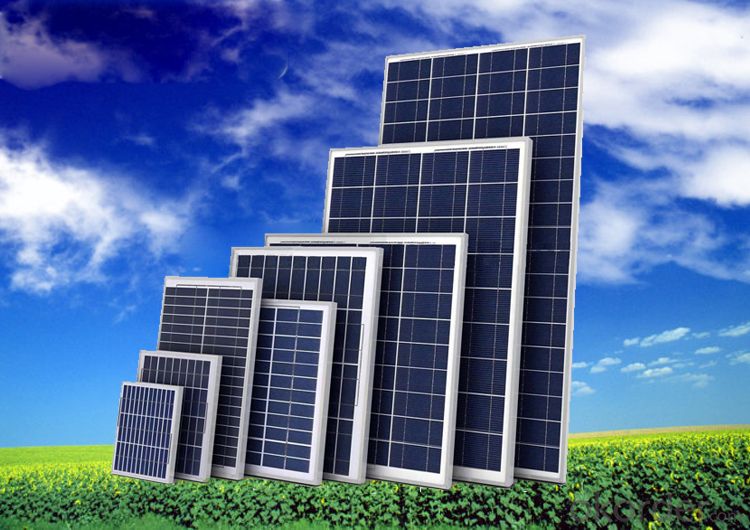
Packing & Shipping:
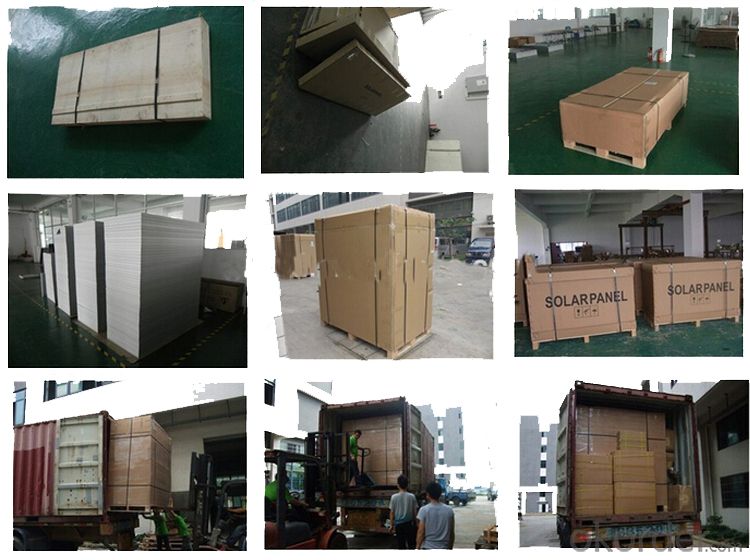
We have rich experience on how to pack the panels to make sure the safety on shipment when it arrives at the destination.
The normal size is packed by 25pcs/ carton / pallet. Paper carton for FCL shipping and wood carton for LCL shipping.
FAQ:
(1)Have you ever sold your products to companies in my country?
Of course, we have customers in all general PV markets, but I think we should expand our market share along with the market growth.
(2)When did your company set up? You are a new company, how can I believe your quality?
We entered into Solar PV industry in 2005, now we have several plants in manufacturing of a-Si and c-Si panels, and our capacity is 220MW per year. Till now we have already passed all the tests by authorized laboratories, e.g. TUV, VDE, UL.
- Q: Solar panels do good more then bad?
- Like any other materials, solar panels need to be manufactured. These components are usually imported, they use energy to produce and transport. However, once you install solar panels, they need little or no maintenance (except cleaning to maintain efficiency) and they use no other resources to produce power. Over their lifespan, they'll produce more energy than was used to be made, so on the whole good for the environment.
- Q: Can solar panels be used in hot climates?
- Yes, solar panels can be used in hot climates. In fact, solar panels actually perform better in higher temperatures as they rely on sunlight rather than heat to generate electricity. However, excessive heat may slightly reduce the efficiency of the panels, but modern solar technology is designed to handle and adapt to varying weather conditions, including hot climates.
- Q: I have a 500 watt inverter and battery but need solar panels to run my need. I want to have enough juice to run a computer and monitor and sometimes a 5w amp. I am not sure how much power is needed to run the computer (standard desktop with 5flat screen with an additional surround sound system) though on the side of the computer it says 5 amp but I know I used to run it and monitor and surround sound with a heating blanket on the same circuit which was rated at 20 amps. My question is that I would like to go and buy some panels (cheaply as I'm unemployed) from somewhere like Harbor Freight that would meet the need of the converter to supply enough amperage. So what size panel(s) or panels would I need to run this setup? If I am correct I think 500 watts is equal to 5 amps. Would this even work? Could I run a partial system where I could run some of the stuff to take a load off? I need to lower my electric bill somehow. Thanks!
- Solar okorder in their survival discussion in the archive, this exact project was discussed at length.
- Q: What in the solar panel wares out so that the panel can not convert the suns energy to electric energy? Please post were you get answers.
- They really don't stop working unless there is some sort of manufacturers deficiency, where a connecting tab(wire) is broken. Generally their output just decreases over the years. There are plenty of solar panels over 40 years old still producing electricity, which is 0 years past the typical 30 year manufacturers waranty.
- Q: I want to get solar panels but not spend 20,000!! I found out that you can get a panel to run only your AC unit, I also found something that will run my pool pump! Anyone own either of these? How did you do? Where did you go? How much was it, and was it hard to install?
- I recenty had a system installed for my home, you can get a system that will dramatically reduce your over all electric bill for $20K. My system which is currently running my meter backwards from about 8:30 am till about 6pm cost me around $8K, I did get a $0K rebate and I'll get a $2K federal tax credit. I just had the system installed this week, so I won't know how much it will take away from my yearly consumption for a while. I personally think an overall system is a beter financial option. If you get one that just runs your a/c then you lose the benifit of the energy it is producing when the a/c isn't running. It makes sense to have a system to run an item that is located away from a source of electricity, but then you would need to invest in a storage system. The best advice, is to have a contractor come out and give you a quote. You can get a system that will produce part of your electricity all year and you can always add to it at a later time to eleminate your electric bill.
- Q: my solar car works when using the Battery but when there is sunlight i connect the wires to the solar panel and it does not work...................HELP
- If that solar panel came with the car, the panel is most likely defective. Make sure you're in bright sunlight, and try holding the car so that the wheels are not touching the ground. If the wheels still won't turn, even slowly, then the panel is bad. If each person in the class got one, see if you can try your panel on a friend's car, or their panel on your car. If this is just any little panel, it could be that the panel simply does not have enough voltage, current, or both to power the motor on the car.
- Q: Can solar panels be installed on a carport structure?
- Yes, solar panels can be installed on a carport structure. In fact, carports are a popular choice for solar panel installations because they provide a dual purpose of providing shade for vehicles while generating clean, renewable energy. The structure of a carport offers ample space for solar panels to be mounted, allowing for efficient energy production while maximizing the use of available space.
- Q: how much energy does solar panels save you? (like a month, year, etc)
- It depends on the size of the solar panels and the intensity of the solar-light. So, there's difference in every place. It's impossible to answer unless there's detail of panel size, panel quantities, average rainfall, average solar days, etc.
- Q: Can solar panels be installed on a remote island or location?
- Yes, solar panels can be installed on a remote island or location. Solar panels are a flexible and sustainable energy solution that can function independently of the grid, making them suitable for remote areas. They can generate electricity by harnessing sunlight, which is abundant in most locations, including islands. Additionally, advancements in solar technology have made it possible to install panels in challenging environments, such as extreme temperatures or harsh weather conditions.
Send your message to us
Solar Panels Norfolk - Energy Saving Photovoltaic Panels Purchase
- Loading Port:
- Shanghai
- Payment Terms:
- TT OR LC
- Min Order Qty:
- 7875 watt
- Supply Capability:
- 10000000 watt/month
OKorder Service Pledge
OKorder Financial Service
Similar products
Hot products
Hot Searches
Related keywords
